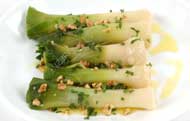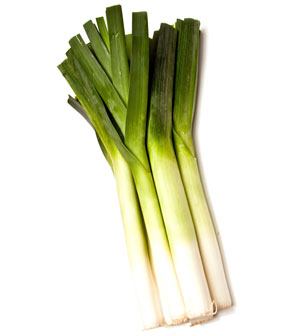





1. Leek Facts
2. Types of Leeks
3. Nutritional value
4. Health Benefits
Leeks - a biennial herbaceous plant (Allium porrum synonym A. ampeloprasum var. porrum) of the amaryllis family. The genus Allium also contains the onion, garlic, shallot, scallion, chive.
History and Origin
Leeks have been a favourite in cuisines around the world for thousands of years. The leek begins its story in the Mediterranean region and Central Asia. It’s believed by many that the leek is native to this area. Wild forms of Allium ampeloprasum can still be found growing in these regions, providing strong evidence for its origins.
Evidence from ancient Egypt indicates that leeks were a significant part of the diet. Carvings and Paintings found in tombs depict leeks being offered to the gods and consumed by the living. These depictions suggest that leeks held a prominent place in Egyptian culture.
The Romans also consumed leeks, they valued the leek for its flavour and believed medicinal qualities. Roman emperor, Nero, consumed leeks regularly, believing they improved his singing voice.
Roman writer “Apicius”, included leeks in many recipes, showcasing their versatility in Roman cuisine. The Romans also introduced leeks to many parts of Europe, including Britain, where they become a favoured vegetable.
- • American Flag Leeks
- • Autumn Giant Leeks
- • Bandit Leeks
- • Bleu de Solaise Leeks
- • Giant Musselburgh Leeks
- • Jolant Leeks
- • King Richard Leeks
- • Lancelot Leeks
- • Lincoln Leeks
- • Tadorna Blue Leeks
- • Baby leeks
- • Ramps
Leeks can be classified by maturity season (summer, autumn, winter), growth cycle (short or long season), and the length of their white stem (long, short, or semi-long). Popular varieties include 'American Flag', 'Musselburgh', and 'Carentan', which are often differentiated by their size, flavour, and cold hardiness.
Types of leeks
By maturity season
Summer leeks: Harvested during the summer, often smaller and with a more delicate flavour.
Autumn leeks: A category for leeks harvested in the autumn season.
Autumn-Winter leeks: A category for leeks harvested during both the autumn and winter seasons.
Winter leeks: Harvested in late fall or winter, these are typically thicker and more-cold hardy than summer varieties.
By growth cycle
Short-season leeks: These have a faster growth cycle, are generally smaller, and less hardy, with a milder taste.
Long-season leeks: These take longer to mature, can be left in the ground for overwintering, and are usually larger and more cold-tolerant.
By stem length
Long-stemmed: Varieties like 'Colonna' and 'Argenta' have longer white bases.
Short-stemmed: Varieties such as 'Grueso de Rouen' and 'Malabare' are shorter.
Semi-long: Varieties that fall between short and long-stemmed.
Other types
Baby leeks: Pencil-thin with a sweeter taste than mature leeks.
Ramps: Also known as wild leeks, these have a pungent, onion-like flavour and grow in eastern North America.
Vegetables " Leek "
Nutritional value per 100 g
Leeks, (bulb and lower leaf-portion), cooked, boiled, drained, without salt
|
Nutrient (Proximity)
|
Unit
|
Value
|
Daily Value %
|
|
Energy
|
kcal
|
31 | 1.5% |
|
Protein
|
g
|
0.81 | 1.6% |
|
Total lipid (fat)
|
g
|
0.20 | 0.2% |
|
Carbohydrate, by difference
|
g
|
7.62 | 2.7% |
|
Fiber, total dietary
|
g
|
1.0 | 3.5% |
|
Sugars, total
|
g
|
2.11
|
|
|
Minerals
|
|||
|
Calcium, Ca
|
mg
|
30 | 2.3% |
|
Iron, Fe
|
mg
|
1.10 | 6.1% |
|
Magnesium, Mg
|
mg
|
14 | 3.3% |
|
Phosphorus, P
|
mg
|
17 | 1.3% |
|
Potassium, K
|
mg
|
87 | 1.8% |
|
Sodium, Na
|
mg
|
10 | 0.4% |
|
Zinc, Zn
|
mg
|
0.06 | 0.5% |
|
Copper, Cu
|
mg
|
0.062 | 6.8% |
|
Manganese, Mn
|
mg
|
0.247 | 10.7% |
|
Selenium, Se
|
mcg
|
0.5 | 0.9% |
|
Vitamins
|
|||
|
Vitamin C, total ascorbic acid
|
mg
|
4.2 | 4.6% |
|
Thiamin (B-1)
|
mg
|
0.026 | 2.1% |
|
Riboflavin (B-2)
|
mg
|
0.020 | 1.5% |
|
Niacin (B-3)
|
mg
|
0.200 | 1.2% |
|
Pantothenic acid (B-5)
|
mg
|
0.072 | 1.4% |
|
Vitamin B-6
|
mg
|
0.113 | 6.6% |
|
Folate, total (B-9)
|
mcg
|
24 | 6% |
|
Vitamin B-12
|
mcg
|
0.00
|
|
|
Vitamin A, RAE
|
mcg
|
83 | 9.2% |
|
Vitamin E (alpha-tocopherol)
|
mg
|
0.50 | 3.3% |
|
Vitamin D (D2 + D3)
|
mcg
|
0
|
|
|
Vitamin K (phylloquinone)
|
mcg
|
25.4 | 21.1% |
|
Lipids
|
|||
|
Saturated Fatty Acids
|
g
|
0.027
|
0.1% |
|
Monounsaturated Fatty Acids
|
g
|
0.003
|
|
|
Polyunsaturated Fatty Acids
|
g
|
0.111
|
|
|
Trans Fatty Acids
|
g
|
0.000
|
|
|
Carotenoids
|
|||
|
Beta-Carotene
|
mcg
|
487
|
|
|
Alpha-Carotene
|
mcg
|
||
|
Beta-Cryptoxanthin
|
mcg
|
||
|
Lutein + zeaxanthin
|
mcg
|
925
|
|

|
Reference Values are based on a 2,000 Calorie Intake, for Adults and Children 4 or More Years of Age. Your daily values may be higher or lower depending on your calorie needs.
|
|
Percentages are roughly approximated using (RDA) Recommended Dietary Allowances for adults. Source: USDA United States Department of Agriculture
|
|
Reference Values for Nutrition - FDA U.S. Food and Drug Administration
|
Leek Nutritional Value
Leeks offer numerous health benefits, primarily due to their rich content of antioxidants, flavonoids like kaempferol, and sulphur compounds such as allicin. These compounds contribute to strong heart health by reducing cholesterol, blood pressure, and inflammation. Leeks also promote digestive health through dietary fiber and prebiotics, while their antioxidant properties may offer protection against certain cancers and support the immune system. Additionally, they are an excellent source of essential nutrients like Vitamin K for bone health and B vitamins for blood vessel protection.
Other garlic health benefits not listed on table below;
Essential eye health - Leek’s support eye health by providing essential nutrients, particularly lutein and zeaxanthin, which are carotenoids that protect against age-related macular degeneration (AMD) and cataracts by reducing oxidative damage and harmful blue light. Leeks are also rich in vitamin A, which is converted from beta-carotene and is crucial for vision, especially in low light, and is involved in creating the pigments in the retinas.
- RICH IN VITAMINS AND MINERALS
Leeks are rich in vitamins and minerals, including being an excellent source of vitamin K, vitamin A, and manganese. They also provide significant amounts of vitamin C, folate, and vitamin B6, along with other nutrients like iron, copper, potassium, and magnesium. - RICH IN FLAVONOIDS
Leeks are a source of "flavonoid power" because they are rich in flavonoids like kaempferol, which act as powerful antioxidants that combat harmful free radicals, reduce inflammation, and may lower the risk of certain chronic diseases, including some cancers and cardiovascular issues, by protecting blood vessel linings. - BENEFICIAL ORGANOSULFUR COMPOUNDS
Leeks contain beneficial organosulfur compounds, such as allicin, diallyl sulphide, diallyl disulfide, and diallyl trisulfide, which are responsible for their pungent flavour and contribute to antioxidant, anti-inflammatory, cardioprotective, and potential anti-cancer effects. These compounds are activated when leeks are cut or crushed, forming bioactive substances that offer various health benefits. - ANTIOXIDANT AND ANTI-INFLAMMATORY EFFECTS
Leeks offer significant antioxidant and anti-inflammatory benefits due to their rich content of bioactive compounds, including flavonoids like kaempferol, sulphur compounds, and other beneficial plant chemicals. These components help combat oxidative stress and reduce inflammation by inactivating pathways such as NF-κB and inhibiting enzymes like COX-2 and iNOS. This suggests potential protective roles in heart health, as well as anti-cancer and anti-diabetic properties.

- SUPPORT HEART HEALTH
Leek’s support heart health by providing kaempferol, an antioxidant that reduces inflammation and protects against heart disease, and allicin, which lowers cholesterol and blood pressure. They also contain prebiotic fiber that benefits the gut microbiome and are a good source of folic acid (Vitamin B9) for red blood cell health. Leeks are a low-calorie, nutrient-dense vegetable that can be a heart-healthy addition to a balanced diet. - BENEFIT DIGESTIVE HEALTH
Leeks benefit digestive health by providing dietary fiber, including prebiotics like fructo-oligosaccharides (FOS) and inulin, which nourish beneficial gut bacteria and promote a healthy gut microbiome. This fiber also promotes regular bowel movements, prevents constipation, and supports efficient nutrient absorption. Leeks also contain beneficial antioxidants and sulphur compounds that further support gut and overall health. - CANCER PREVENTION
Cancers of the prostate, stomach, colon, and oesophagus are rarer in those who consume a lot of garlic, shallots, chives, onions, and leeks. Researchers think that the antioxidants in allium vegetables repair damaged DNA. Many studies have found evidence for a reduced risk of colorectal cancer. - BLOOD VESSEL SUPPORT
Leek’s support blood vessel health due to compounds like kaempferol, which protects blood vessel linings, and allicin, an organosulfur compound that helps lower blood pressure by relaxing blood vessels. Leeks also contain potassium, a vasodilator that helps with smooth blood flow, and folate and Vitamin B6, which balance homocysteine levels, an amino acid linked to increased risk of blood clots and strokes.
References
Nutrient Database - USDA (United States Department of Agriculture)
Reference Values for Nutrition - FDA U.S. Food and Drug Administration
Eye Health - Leek’s support eye health by providing essential nutrients, particularly lutein and zeaxanthin, which are carotenoids that protect against age-related macular degeneration (AMD) and cataracts by reducing oxidative damage and harmful blue light. Leeks are also rich in vitamin A, which is converted from beta-carotene and is crucial for vision, especially in low light, and is involved in creating the pigments in the retinas.
Bone and Vision Health - Leeks support bone health primarily through their rich Vitamin K content, which aids bone mineralization and may reduce the risk of osteoporosis, and manganese, which is crucial for cartilage and collagen formation. They are beneficial for vision health because they contain the carotenoids lutein and zeaxanthin, which protect the eyes from age-related macular degeneration and cataracts, as well as Vitamin A for general vision and immune support.
Cancer Prevention - Cancers of the prostate, stomach, colon, and oesophagus are rarer in those who consume a lot of garlic, shallots, chives, onions, and leeks. Researchers think that the antioxidants in allium vegetables repair damaged DNA. Many studies have found evidence for a reduced risk of colorectal cancer.
DNA Protection - Leeks protect against DNA damage through several mechanisms, including their content of antioxidant compounds like folate, flavonoids (such as quercetin), and allyl sulphides (like diallyl trisulfide) which scavenge free radicals and prevent DNA adduct formation. They also contain inulin, a fiber that promotes gut health and may protect DNA from mutations, and their anti-inflammatory properties, linked to the activation of the NF-κB pathway, also contribute to DNA protection by reducing inflammation-related damage.
Antioxidant and Anti-inflammatory Effects - Leeks offer significant antioxidant and anti-inflammatory benefits due to their rich content of bioactive compounds, including flavonoids like kaempferol, sulphur compounds, and other beneficial plant chemicals. These components help combat oxidative stress and reduce inflammation by inactivating pathways such as NF-κB and inhibiting enzymes like COX-2 and iNOS. This suggests potential protective roles in heart health, as well as anti-cancer and anti-diabetic properties, though more human studies are needed to confirm these effects.
Digestive Health - Leeks benefit digestive health by providing dietary fiber, including prebiotics like fructo-oligosaccharides (FOS) and inulin, which nourish beneficial gut bacteria and promote a healthy gut microbiome. This fiber also promotes regular bowel movements, prevents constipation, and supports efficient nutrient absorption. Leeks also contain beneficial antioxidants and sulphur compounds that further support gut and overall health.
Blood Vessel Support - Leek’s support blood vessel health due to compounds like kaempferol, which protects blood vessel linings, and allicin, an organosulfur compound that helps lower blood pressure by relaxing blood vessels. Leeks also contain potassium, a vasodilator that helps with smooth blood flow, and folate and Vitamin B6, which balance homocysteine levels, an amino acid linked to increased risk of blood clots and strokes.
Heart Health - Leek’s support heart health by providing kaempferol, an antioxidant that reduces inflammation and protects against heart disease, and allicin, which lowers cholesterol and blood pressure. They also contain prebiotic fiber that benefits the gut microbiome and are a good source of folic acid (Vitamin B9) for red blood cell health. Leeks are a low-calorie, nutrient-dense vegetable that can be a heart-healthy addition to a balanced diet.
Organosulfur Compounds - Leeks contain beneficial organosulfur compounds, such as allicin, diallyl sulphide, diallyl disulphide, and diallyl trisulfide, which are responsible for their pungent flavour and contribute to antioxidant, anti-inflammatory, cardioprotective, and potential anti-cancer effects. These compounds are activated when leeks are cut or crushed, forming bioactive substances that offer various health benefits.
Flavonoid power - Leeks are a source of "flavonoid power" because they are rich in flavonoids like kaempferol, which act as powerful antioxidants that combat harmful free radicals, reduce inflammation, and may lower the risk of certain chronic diseases, including some cancers and cardiovascular issues, by protecting blood vessel linings.
